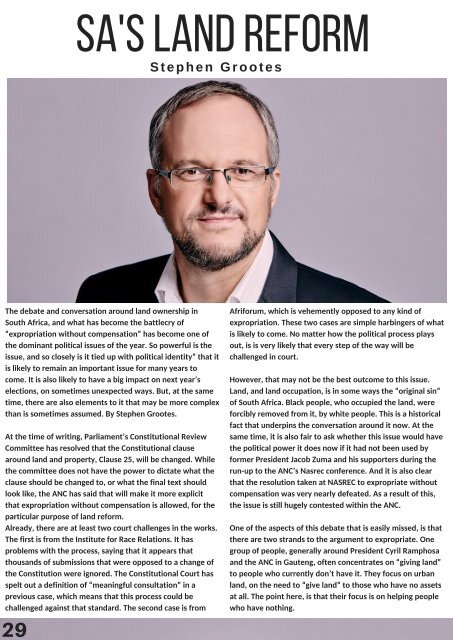Speakers Inc Magazine, Volume 2
Create successful ePaper yourself
Turn your PDF publications into a flip-book with our unique Google optimized e-Paper software.
S t e p h e n G r o o t e s<br />
REFORM<br />
LAND SA'S<br />
The debate and conversation around land ownership in<br />
South Africa, and what has become the battlecry of<br />
“expropriation without compensation” has become one of<br />
the dominant political issues of the year. So powerful is the<br />
issue, and so closely is it tied up with political identity” that it<br />
is likely to remain an important issue for many years to<br />
come. It is also likely to have a big impact on next year’s<br />
elections, on sometimes unexpected ways. But, at the same<br />
time, there are also elements to it that may be more complex<br />
than is sometimes assumed. By Stephen Grootes.<br />
At the time of writing, Parliament’s Constitutional Review<br />
Committee has resolved that the Constitutional clause<br />
around land and property, Clause 25, will be changed. While<br />
the committee does not have the power to dictate what the<br />
clause should be changed to, or what the final text should<br />
look like, the ANC has said that will make it more explicit<br />
that expropriation without compensation is allowed, for the<br />
particular purpose of land reform.<br />
Already, there are at least two court challenges in the works.<br />
The first is from the Institute for Race Relations. It has<br />
problems with the process, saying that it appears that<br />
thousands of submissions that were opposed to a change of<br />
the Constitution were ignored. The Constitutional Court has<br />
spelt out a definition of “meaningful consultation” in a<br />
previous case, which means that this process could be<br />
challenged against that standard. The second case is from<br />
Afriforum, which is vehemently opposed to any kind of<br />
expropriation. These two cases are simple harbingers of what<br />
is likely to come. No matter how the political process plays<br />
out, is is very likely that every step of the way will be<br />
challenged in court.<br />
However, that may not be the best outcome to this issue.<br />
Land, and land occupation, is in some ways the “original sin”<br />
of South Africa. Black people, who occupied the land, were<br />
forcibly removed from it, by white people. This is a historical<br />
fact that underpins the conversation around it now. At the<br />
same time, it is also fair to ask whether this issue would have<br />
the political power it does now if it had not been used by<br />
former President Jacob Zuma and his supporters during the<br />
run-up to the ANC’s Nasrec conference. And it is also clear<br />
that the resolution taken at NASREC to expropriate without<br />
compensation was very nearly defeated. As a result of this,<br />
the issue is still hugely contested within the ANC.<br />
One of the aspects of this debate that is easily missed, is that<br />
there are two strands to the argument to expropriate. One<br />
group of people, generally around President Cyril Ramphosa<br />
and the ANC in Gauteng, often concentrates on “giving land”<br />
to people who currently don’t have it. They focus on urban<br />
land, on the need to “give land” to those who have no assets<br />
at all. The point here, is that their focus is on helping people<br />
who have nothing.<br />
29






